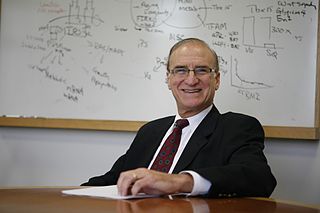Related Research Articles

Endocrinology is a branch of biology and medicine dealing with the endocrine system, its diseases, and its specific secretions known as hormones. It is also concerned with the integration of developmental events proliferation, growth, and differentiation, and the psychological or behavioral activities of metabolism, growth and development, tissue function, sleep, digestion, respiration, excretion, mood, stress, lactation, movement, reproduction, and sensory perception caused by hormones. Specializations include behavioral endocrinology and comparative endocrinology.

Metabolic syndrome is a clustering of at least three of the following five medical conditions: abdominal obesity, high blood pressure, high blood sugar, high serum triglycerides, and low serum high-density lipoprotein (HDL).

Metformin, sold under the brand name Glucophage, among others, is the main first-line medication for the treatment of Type 2 diabetes, particularly in people who are overweight. It is also used in the treatment of polycystic ovary syndrome, and is sometimes used as an off-label adjunct to lessen the risk of metabolic syndrome in people who take antipsychotics. It has also been shown to inhibit inflammation, and is not associated with weight gain. Metformin is taken orally.

Insulin-like growth factor 1 (IGF-1), also called somatomedin C, is a hormone similar in molecular structure to insulin which plays an important role in childhood growth, and has anabolic effects in adults. In the 1950s IGF-1 was called "sulfation factor" because it stimulated sulfation of cartilage in vitro, and in the 1970s due to its effects it was termed "nonsuppressible insulin-like activity" (NSILA).

Acanthosis nigricans is a medical sign characterised by brown-to-black, poorly defined, velvety hyperpigmentation of the skin. It is usually found in body folds, such as the posterior and lateral folds of the neck, the armpits, groin, navel, forehead and other areas.
Denise Louise Faustman is an American physician and medical researcher. An associate professor of medicine at Harvard University and director of the Immunobiology Laboratory at Massachusetts General Hospital, her work specializes in diabetes mellitus type 1 and other autoimmune diseases. She has worked at Massachusetts General Hospital in Boston since 1985.
A complication in medicine, or medical complication, is an unfavorable result of a disease, health condition, or treatment. Complications may adversely affect the prognosis, or outcome, of a disease. Complications generally involve a worsening in the severity of the disease or the development of new signs, symptoms, or pathological changes that may become widespread throughout the body and affect other organ systems. Thus, complications may lead to the development of new diseases resulting from previously existing diseases. Complications may also arise as a result of various treatments.

Diabetic nephropathy, also known as diabetic kidney disease, is the chronic loss of kidney function occurring in those with diabetes mellitus. Diabetic nephropathy is the leading causes of chronic kidney disease (CKD) and end-stage renal disease (ESRD) globally. The triad of protein leaking into the urine, rising blood pressure with hypertension and then falling renal function is common to many forms of CKD. Protein loss in the urine due to damage of the glomeruli may become massive, and cause a low serum albumin with resulting generalized body swelling (edema) so called nephrotic syndrome. Likewise, the estimated glomerular filtration rate (eGFR) may progressively fall from a normal of over 90 ml/min/1.73m2 to less than 15, at which point the patient is said to have end-stage renal disease. It usually is slowly progressive over years.
Breakthrough T1D is a nonprofit 501(c)(3) organization that funds type 1 diabetes (T1D) research, provides a broad array of community and activist services to the T1D population and actively advocates for regulation favorable to medical research and approval of new and improved treatment modalities. It was initially founded as the JDF, the Juvenile Diabetes Foundation, before changing its name to Juvenile Diabetes Research Foundation, later shortened to JDRF. As of 2024 it is known as Breakthrough T1D.

Type 1 diabetes (T1D), formerly known as juvenile diabetes, is an autoimmune disease that originates when cells that make insulin are destroyed by the immune system. Insulin is a hormone required for the cells to use blood sugar for energy and it helps regulate glucose levels in the bloodstream. It results in high blood sugar levels in the body prior to treatment. The common symptoms of this elevated blood sugar are frequent urination, increased thirst, increased hunger, weight loss, and other serious complications. Additional symptoms may include blurry vision, tiredness, and slow wound healing. Symptoms typically develop over a short period of time, often a matter of weeks if not months.
Slowly evolving immune-mediated diabetes, or latent autoimmune diabetes in adults (LADA), is a form of diabetes that exhibits clinical features similar to both type 1 diabetes (T1D) and type 2 diabetes (T2D), and is sometimes referred to as type 1.5 diabetes. It is an autoimmune form of diabetes, similar to T1D, but patients with LADA often show insulin resistance, similar to T2D, and share some risk factors for the disease with T2D. Studies have shown that LADA patients have certain types of antibodies against the insulin-producing cells, and that these cells stop producing insulin more slowly than in T1D patients. Since many people develop the disease later in life, it is often misdiagnosed as type 2 diabetes.
Acquired generalized lipodystrophy (AGL), also known as Lawrence syndrome and Lawrence–Seip syndrome, is a rare skin condition that appears during childhood or adolescence, characterized by fat loss affecting large areas of the body, particularly the face, arms, and legs. There are four types of lipodystrophy based on its onset and areas affected: acquired or inherited, and generalized or partial. Both acquired or inherited lipodystrophy present as loss of adipose tissues, in the absence of nutritional deprivation. The near-total loss of subcutaneous adipose tissue is termed generalized lipodystrophy while the selective loss of adipose tissues is denoted as partial lipodystrophy. Thus, as the name suggests, AGL is a near-total deficiency of adipose tissues in the body that is developed later in life. It is an extremely rare disease with only about 100 cases reported worldwide. There are three main etiologies of AGL suspected: autoimmune, panniculitis-associated, or idiopathic. After its onset, the disease progresses over a few days, weeks, months, or even in years. Clinical presentations of AGL are similar to other lipodystrophies, including metabolic complications and hypoleptinemia. Treatments are also similar and mainly supportive for symptomatic alleviation. Although HIV- or drug-induced lipodystrophy are types of acquired lipodystrophy, their origins are very specific and distinct and hence are usually not discussed with AGL.
Michael Cowley FTSE is an Australian physiologist. He is best known for his mapping of the neural circuits involved in metabolism and obesity and diabetes treatment. He is a professor in the Department of Physiology at Monash University in the Faculty of Biomedical and Psychological Sciences. He is also a director of the Australian diabetes drug development company, Verva Inc, and director of the Monash Obesity & Diabetes Institute] (modi).

JeffreyFlier is an American physician, endocrinologist; widely cited scientist; the Higginson Professor of Medicine and Physiology at Harvard Medical School; and a Distinguished Service Professor at the same institution. He was the 21st Dean of the Faculty of Medicine at Harvard University from 2007 to 2016.

Mark Atkinson is an American medical researcher best known for his contributions to research seeking to predict, prevent, and cure type 1 diabetes. He is the author of over 600 publications and is one of the world's most cited diabetes researchers.

Sir Stephen Patrick O'Rahilly is an Irish-British physician and scientist known for his research into the molecular pathogenesis of human obesity, insulin resistance and related metabolic and endocrine disorders.

Carl Ronald Kahn is an American physician and scientist, best known for his work with insulin receptors and insulin resistance in diabetes and obesity. He is the Chief Academic Officer at Joslin Diabetes Center, the Mary K. Iacocca Professor of Medicine at Harvard Medical School and a member of the National Academy of Sciences since 1999.
Undurti Narasimha Das shortly Undurti N. Das and U. N. Das is an Indian clinical immunologist, endocrinologist and the founder president and chief executive officer of UND Life Sciences. Additionally, he serves as the Chief Medical Officer and the Chairman of the Scientific Advisory Board of Asha Nutrition Sciences, Inc. An elected fellow of the National Academy of Medical Sciences, Das is known for his researches in the fields of Immunology, Endocrinology and Rheumatology. He holds a number of patents for his work The Council of Scientific and Industrial Research, the apex agency of the Government of India for scientific research, awarded him the Shanti Swarup Bhatnagar Prize for Science and Technology, one of the highest Indian science awards for his contributions to Medical Sciences in 1992.

Judith E. Fradkin is an American physician-scientist. She was the director of the Division of Diabetes, Endocrinology, and Metabolic Diseases at the National Institute of Diabetes and Digestive and Kidney Diseases from 2000 to 2018.
George Stephen Eisenbarth was an American diabetologist who specialized in type 1 diabetes. He helped to establish the autoimmune basis of the disease.
References
- 1 2 3 4 5 Aven, Las (16 September 2011). "Fruktad sjukdom nara ta mitt liv". Dagensps.se (in Swedish). Archived from the original on 4 March 2016. Retrieved 19 February 2014.
- 1 2 Weintraub, Karen (30 July 2013). "Diabetes drug metformin proves useful for other problems". USA Today. Retrieved 19 February 2014.
- ↑ Khan, Amir (22 September 2013). "Psoriasis Drug Shows Promise For Treating Type 1 Diabetes". Everyday Health. Retrieved 19 February 2014.
- ↑ Doyle, Jessica Ryen (12 December 2012). "Scientists aim to treat autoimmune diseases with worm-based therapy". Fox News. Retrieved 20 February 2014.
- ↑ Billups, Erin (7 August 2013). "Parasitic Worm May Be Answer To Fighting Autoimmune Disease". NY1 . Archived from the original on 27 February 2014. Retrieved 20 February 2014.
- 1 2 Marcial, Gene (18 September 2013). "Regenerative Medicine, Global Aging Were Hot Topics At Life Science Conference in Stockholm". Forbes. Retrieved 19 February 2014.
- 1 2 Leach, Chris (25 April 2013). "The Hygiene Hypothesis: Too Clean for Our Own Good?". Insulin Nation. Retrieved 19 February 2014.
- 1 2 3 "Workaholic who braked at the last moment". Kiberaproduction (in Swedish). Google Translate. 16 September 2011. Retrieved 25 February 2014.
- ↑ "Karin Hehenberger ny Senior Investment Director pa SLS Venture". Cision (in Swedish). 3 October 2005. Retrieved 19 February 2014.
- ↑ "Coronado Biosciences Promotes Karin Hehenberger to Executive Vice President and Chief Medical Officer". Coronado Biosciences. Global Newswire. 25 April 2012. Retrieved 24 February 2014.
- ↑ Haskell, Lindsay (11 March 2013). "Interview with Dr. Hehenberger of Coronado Biosciences – Using worms to treat diabetes". Information About Diabetes. Retrieved 19 February 2014.
- ↑ Seiffert, Don (22 February 2013). "Coronado to pay up to $5.85M in research, licensing deal". Boston Business Journal. Retrieved 19 February 2014.
- ↑ "BioPharm America 2012 program features industry's biggest names providing insight on doing better deals" (Press release). EBD Group. Archived from the original on 24 April 2014. Retrieved 20 February 2014.
- ↑ Resende, Patricia (14 September 2012). "Bio cluster prepares for BioPharm America 2012". Boston Business Journal. Retrieved 19 February 2014.
- ↑ Hidalgo, Anneli (22 August 2013). "Addressing Aging at SALSS". Nordic Life Science. Retrieved 19 February 2014.